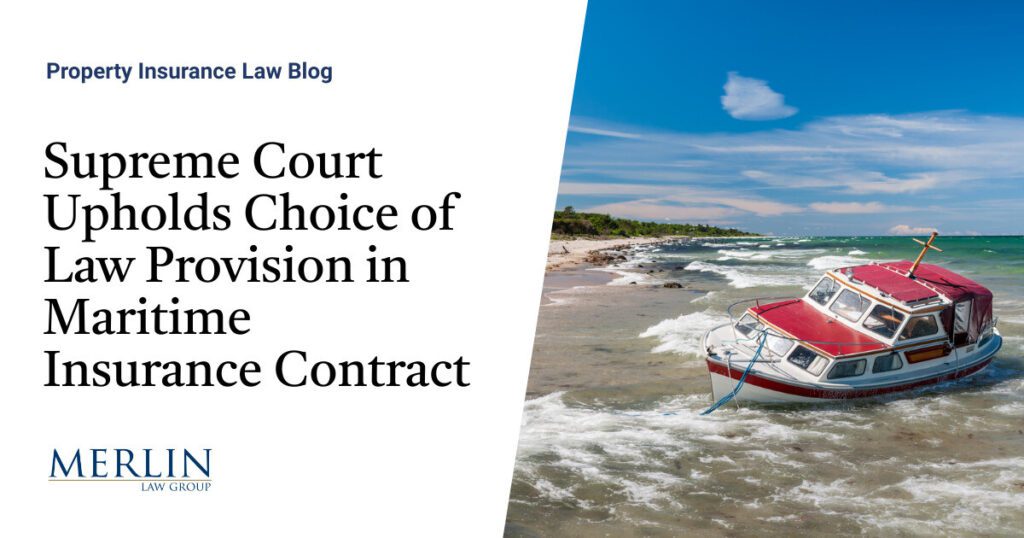Supreme Court Upholds Choice of Law Provision in Maritime Insurance Contract

My bet is that a Pennsylvania policyholder with a boat that was damaged in Ft. Lauderdale never expected that loss would end up in the United States Supreme Court, with the Court upholding policy language mandating that New York law would apply.1 99.9999% of all policyholders never ask if the policy which they are purchasing has a choice of law clause. Indeed, virtually all policyholders do not even get a copy of the insurance product until after they purchase it to determine if the contract has a choice of law clause.
A choice of law clause in an insurance policy specifies what jurisdiction’s law will apply. The clause is important because it influences the law and rules regarding interpretation of the policy, it impacts coverage, whether bad faith laws apply, and the amount of damages that can be obtained. Most insurance companies who place a choice of law clause into a policy select a jurisdiction with laws favorable to the insurance company. New York is a favorite state law often found in choice of law clauses.
The United States Supreme Court held that choice of law clauses in maritime insurance contracts are valid and generally enforceable unless they conflict with federal law.2 We discussed this pending case in The Chamber of Commerce Is in Bed with the Insurance Industry and Acting Against the Interests of Commercial Policyholders:
[L]et’s consider a recent case involving damage to a yacht owned by a Pennsylvania business. The insurer, operating under the name ‘Great Lakes Insurance Company,’ is based in London, England, despite the absence of any Great Lakes in England. The yacht suffered approximately $300,000 worth of damage when it ran aground. During the claims investigation, Great Lakes discovered that the yacht’s fire extinguishers hadn’t been inspected within the specified time frame, even though they were working, and the grounding incident had no connection to the fire. Exploiting this technicality, the London-based insurer denied the claim.
Consequently, the boat owner filed a lawsuit, citing breach of contract and bad faith under Pennsylvania law. However, the insurer argued that the policy’s choice-of-law provision applied New York law and that Pennsylvania’s bad faith protection statutes didn’t apply. The boat owner contended that Pennsylvania had a strong public policy aimed at punishing insurers that acted in bad faith to protect its citizens, which should take precedence over the choice-of-law provision. Additionally, the insured business pointed out that the agent was located in Pennsylvania and that Great Lakes had sued the insured business in a Pennsylvania court.
The dispute has now reached the United States Supreme Court, centering around the choice-of-law provision. In response, the Chamber of Commerce of the United States has submitted an amicus brief.
Does the Chamber of Commerce support the business from the United States or the one from London, England? Does it advocate for bad faith laws to protect policyholders from unscrupulous insurers?
Regrettably, the Chamber of Commerce of the United States, much like a Benedict Arnold, supports the London-based insurance company. In fact, its brief is jointly filed with the American Property Casualty Insurance Association. The Chamber of Commerce’s affiliation with the insurance industry is evident. It is essential for every business owner in the United States, regardless of their size, to reflect upon this when the Chamber of Commerce claims to be assisting businesses.
Choice of law clauses are becoming more prevalent in all insurance policies, not just maritime insurance policies. Policyholders, public adjusters, and restoration contractors should carefully check for such clauses after a loss occurs. Insurance agents should determine if these clauses exist before selling the policy to unsuspecting policyholders because those clauses significantly impact the policyholder’s rights after a loss.
Thought For The Day
In North Carolina, playing bingo while intoxicated is illegal. Because, clearly, bingo is a game of high stakes and sharp minds.
—Jack Browning
1 Great Lakes Ins. Co. v. Raiders Retreat Realty Co., No. 22-500, 2024 WL 694920 (Feb. 21, 2024).
2 Id.



